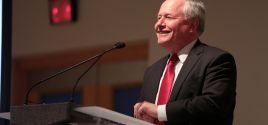Harry Schultz on the Power Elite, Free Markets, the Internet and Why Gold Is Going Much HigherInterview with Scott SmithThe Daily Bell Jul. 20, 2010 |
Popular 
Bill Kristol: My Fellow White Americans Are 'The Enemy'

Biden's Lebanon Envoy, Ex-Israeli Soldier Amos Hochstein, Gave Israel 'Green Light' to Invade Lebanon

'The First Live-Streamed Genocide': Al Jazeera Documentary Exposes Israeli War Crimes in Gaza

Israel Detains American Journalist for Reporting on Damage from Iran's Strikes [UPDATE]

WATCH: New Film 'Atrocity Inc' Exposes How Israel Lied About October 7th to Justify Genocide
 Introduction: Chevalier Harry D. Schultz, KHC, KM, KCPR, KCSA, KCSS, has written scores of books and is considered a founder of the investment newsletter business. Based in Monaco, and now in his 80s, he has been producing his newsletter, The International Harry Schultz Letter (HSL), for over 45 years. During his 65 years of publishing, Harry has lived in 17 different countries and published his work in many of them. He is truly an international man whose shoulders have rubbed with some of the top political, business and social figures of our time. He prides himself of being stridently anti-communist and anti-socialist. According to the international edition of the Guinness Book of World Records from 1981–2003, Harry Schultz was the highest paid investment consultant in the world fetching anywhere from US$3500 to US$4500 dollars per hour. Mr. Schultz is quoted – even emulated – on a regular basis in various financial books, articles and in interviews including other newsletters. The book, Moneychangers by Lewis Dorsey is based upon Harry Schultz. Knighted five times, Harry is a man for all seasons and a true citizen of the world. Daily Bell: This interview will review material that you've gone over in your books, but we hope you will answer the questions nonetheless as some in our audience are not aware of your works or point of view. A good place to begin would be to ask how did you get interested in finance in the first place? Harry Schultz: I have a love affair with cause-and-effect. The financial world is probably the nearest you can come to discovering the answers to both cause and effect. And that leads on to how to benefit from that knowledge. Daily Bell: When did you adopt a free-market orientation? Harry Schultz: From my earliest ages, I produced a newspaper, via typewriter, then mimeograph, for my mother, then the neighborhood, then the family, then the school & college. I then bought real newspapers, of small size of course, but the principles were nearly the same as for big ones. Running newspapers brings you into close contact with all elements of society. Daily Bell: Did you discover Austrian finance or come to conclusions on your own? Harry Schultz: Cause-and-effect flows neatly from the Austrian approach. I was a friend of Fritz von Hayek, but that was after the event. He spoke at one of my seminars – his first ever at any seminar. I sort of brought him out of the academic closet. He was a delightful good-humored man. Daily Bell: When did you begin writing a financial newsletter and why? Harry Schultz: Those who bought my first book about Bear Markets, published by Prentice Hall, urged me to write newsletters. I continued to write books & booklets, but the newsletters had a more immediate impact. They are faster to the public than books, obviously. Daily Bell: Why do people pay you so much for a consultation? Harry Schultz: Hard to reply without sounding like I'm blowing my own horn. My batting average & forecasts in the Harry Schultz Letter (HSL) have been first rate, so people were willing to pay first-class prices. By the way, I have retired from giving consultations now. At my age, it's enough already. Daily Bell: You've been successful for a very long time – and you may be, indeed, the oldest active investment writer and consultant around. How has the world changed in your opinion? Harry Schultz: It's gotten unpleasant morally, as everyone now realizes – but it's too late for the wakeup call. It's gotten speedier, but not better because of speed. There is scant benefit to speed, whether by car, plane, email or market facilities. Speed has forced people to act before they can think things through. Often speed means you don't weigh the risk/reward factors – as there doesn't seem to be time for it. High-tech makes things easier in many ways, but causes more stress, partly because it keeps breaking down. You see this with computer glitches, crashes and viruses. Also, high-tech goads you into making fast decisions. When big corporations must keep a full-time team of techies on-hand to fix computers that fizzle daily, then tech is not, repeat not, working. Private citizens can't afford the cost or the time-loss to keep tech working. For every hour technology saves us, we lose 75–90 minutes. The stress is not measurable. Typewriters don't break down, yet we are forced to accept computers that do. Autos no longer break down. The computer nerds only want to sell them (Microsoft, Dell, etc.) and promote updates (which cause new problems). They aren't interested in making them as efficient as cars and TVs have become. They've had decades to get it right but have made near zero progress toward reliability. Speed is not a worthy goal, nor is the size of the megabytes your computer can handle. Dependability should be the goal. The same goes for banking, rating agencies and derivatives. Everyone wants profits, not dependability. It's a new form of fraud, masquerading as progress. Morality, where art thou? End of soapbox. Daily Bell: Has investing changed? Harry Schultz: In some respects, the more things change the more they remain the same – which applies mainly to our emotions. And emotions are what make you or break you in markets. You must control them, be able to switch from long to short in a flash, without 'caring' whether your investment has changed direction. I can switch from long gold to short gold in a flash, without emotion. It wasn't always so. You need to learn emotional control. You can be a believer in the gold standard, as I am, but still sell it short during a gold market correction. It's the same with every market. Daily Bell: Has the Internet made a difference in terms of information flow? Harry Schultz: Yes, some good and some bad. The overload of information makes it hard work to sort the wheat from the chaff. There is more to read than you can cope with, so you need great discipline. Not everyone is good at discipline. Oddly your cultural background affects this. Germans are good at discipline. Latins are less interested in it. Weather also plays a role in this, by the way. The thinkers, the book writers, are mostly from cool climate countries. Almost nobody writes books in Africa. It's too hot. Daily Bell: Has it made a difference in your life? Harry Schultz: Certainly. But if I could go back a few years and say yes or no to the Internet being created, I would regrettably say no. It has cost more than it is worth. I think a new form of low-tech (cool-tech?) will emerge. It will be fresh, offering a slower, more thoughtful, dependable, and non-stressful mode of life – happier by far and healthier for certain. Daily Bell: We think that the Internet is like the Gutenberg press and that it is ushering in a new and freer age. Agree? Disagree? Harry Schultz: Freer? Not if you know that all we say in emails goes to the super computer called Echelon headquartered in or near Washington. It's stored there and available to governments. We may have fallen into a trap. Daily Bell: Do you believe in a power elite that is trying to create a one-world order? Harry Schultz: That there is a power elite is a given. Only a fool could not know of it. So, do they want a one-world order? Not all, but enough do to make the effort. We all know that power corrupts, and there is natural tendency to want to assure control. Some persuade themselves they want control for the good of others. That is rubbish of course, but self-delusion comes easily. Daily Bell: You've written that the antidote to a one-world order is 1,000 tiny nations. Do you still believe this? Harry Schultz: Absolutely. Big is generally bad – be it big business that loses touch with customers and then seeks a monopoly, or big bureaucracies that brush aside individualism, or big nations that by their nature can't logically know what is best for all parts of the country. After a time they don't really care. Read the rest of the article July 19, 2010 Copyright © 2010 The Daily Bell |



